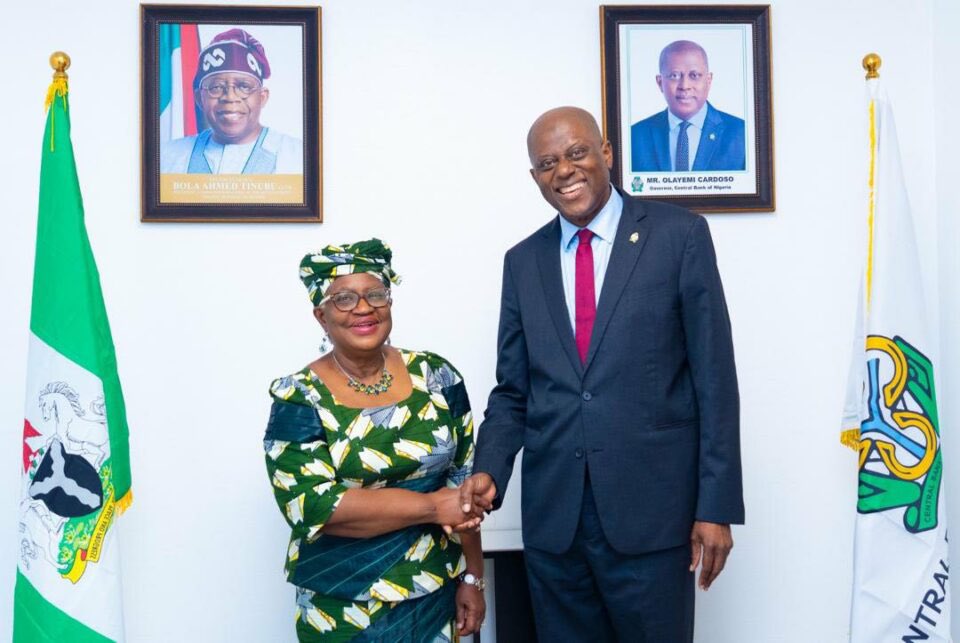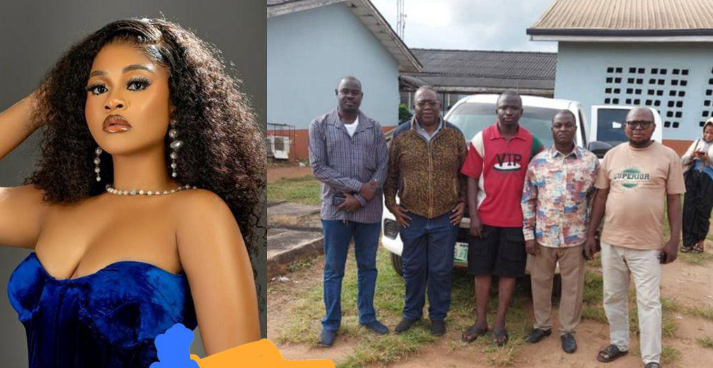
JUST IN: Ngozi Okonjo-Iweala Meets CBN Governor Olayemi Cardoso at Abuja Headquarters in a Landmark Engagement

In a significant development for Nigeria’s economic and trade landscape, Dr. Ngozi Okonjo-Iweala, the esteemed Director-General of the World Trade Organization (WTO), met with Mr. Olayemi Cardoso, the Governor of the Central Bank of Nigeria (CBN), at the Central Bank headquarters in Abuja. The meeting, which has already generated widespread attention across both local and international media, signals a renewed focus on strengthening Nigeria’s position in the global trade system, financial stability, and economic development.
The high-profile engagement, which took place in the heart of Nigeria’s capital, was characterized by cordial discussions and a shared vision for economic growth, trade facilitation, and financial reforms. According to insiders who were present during the meeting, both leaders engaged in a deep exchange of ideas on how Nigeria could leverage its trade potential, improve foreign investment inflows, and navigate the complexities of a rapidly changing global economic environment.
Dr. Okonjo-Iweala, who has consistently championed inclusive trade policies, emphasized the importance of strategic economic partnerships, particularly in the African continent. She noted that Nigeria, as Africa’s largest economy, plays a pivotal role in shaping the continent’s trade policies and financial systems. Her visit to the CBN, therefore, is viewed as a critical step in aligning Nigeria’s monetary policies with broader international trade regulations, ensuring that the country remains competitive in global markets.
On his part, Mr. Cardoso welcomed Dr. Okonjo-Iweala to the CBN headquarters, highlighting the bank’s commitment to fostering an enabling environment for both domestic and international trade. The CBN Governor outlined ongoing initiatives aimed at stabilizing the naira, curbing inflationary pressures, and promoting financial inclusion across the country. He emphasized that collaboration with international organizations like the WTO would enhance Nigeria’s policy frameworks, providing a robust foundation for sustainable economic growth.
Observers have noted that this meeting comes at a time when Nigeria is seeking to diversify its economy and reduce its reliance on oil exports. Both leaders reportedly discussed strategies for boosting sectors such as agriculture, manufacturing, technology, and services, which have the potential to drive long-term economic resilience. By exploring the intersection of trade facilitation and monetary policy, Nigeria aims to create a more favorable business environment that attracts foreign investment while protecting domestic industries.
The discussions also touched on the challenges posed by global economic uncertainties, including fluctuating commodity prices, the impact of international sanctions, and the ongoing effects of the COVID-19 pandemic on global supply chains. Dr. Okonjo-Iweala, with her extensive experience in both finance and international development, offered insights into best practices for mitigating these risks. She highlighted how coordinated policy efforts between the central bank and international trade bodies can enhance Nigeria’s ability to navigate global economic turbulence effectively.
In addition to economic discussions, the meeting is believed to have explored ways to strengthen Nigeria’s participation in multilateral trade negotiations. The WTO Director-General has consistently advocated for fair trade practices, reduction of trade barriers, and greater support for developing nations. By engaging directly with the CBN, Dr. Okonjo-Iweala aims to ensure that Nigeria can leverage its influence within the WTO to secure beneficial trade agreements, expand market access for Nigerian products, and integrate more deeply into global value chains.
Several key stakeholders in Nigeria’s financial and trade sectors have already hailed the meeting as a landmark event. Analysts point out that the collaboration between the WTO and CBN could lead to transformative policies that encourage entrepreneurship, innovation, and cross-border investments. By aligning Nigeria’s monetary strategies with global trade regulations, the country could also enhance its creditworthiness in international markets, attract foreign direct investment, and stimulate job creation across multiple sectors.
The timing of the meeting is also noteworthy, as Nigeria prepares for several upcoming trade and investment summits in the region. Dr. Okonjo-Iweala’s engagement with Mr. Cardoso could pave the way for more structured dialogues with international partners, ensuring that Nigeria’s economic priorities are adequately represented on the global stage. Experts suggest that this could translate into increased funding for infrastructure projects, improved trade facilitation mechanisms, and stronger financial institutions capable of supporting Nigeria’s ambitious growth agenda.
Social media platforms and news outlets have been abuzz since the announcement of the meeting, with stakeholders expressing optimism about the potential outcomes. Many Nigerians view this engagement as a positive signal of the government’s commitment to fostering international cooperation and driving sustainable economic development. The collaboration between the CBN and the WTO, under the leadership of such globally respected figures, is expected to bring renewed confidence to investors, both domestic and international, who have been closely monitoring Nigeria’s economic trajectory.
While the specific details of the discussions remain largely confidential, sources confirm that both leaders agreed to continue engaging on key issues affecting trade, finance, and economic growth. Future collaborations are anticipated, with several initiatives reportedly in the pipeline aimed at strengthening Nigeria’s trade capacity, enhancing financial stability, and promoting inclusive economic development.
As Nigeria continues to navigate a complex global economic environment, meetings of this caliber underscore the importance of strategic partnerships, visionary leadership, and proactive policymaking. The engagement between Dr. Ngozi Okonjo-Iweala and Mr. Olayemi Cardoso represents not just a diplomatic courtesy but a concrete step toward creating a more resilient, globally integrated, and prosperous Nigerian economy.
In conclusion, the historic meeting at the CBN headquarters in Abuja marks a significant milestone in Nigeria’s economic and trade policy journey. With Dr. Okonjo-Iweala’s expertise in global trade and Mr. Cardoso’s leadership in monetary policy, stakeholders are optimistic that this collaboration will yield transformative results for Nigeria’s economy. As discussions continue, all eyes remain on how this engagement will shape the future of trade, finance, and investment in Africa’s largest economy. The outcome of this high-level meeting could very well redefine Nigeria’s role on the international economic stage and set a precedent for future collaborations between the country and global trade institutions.
---
If you want, I can also enhance this version with even more vivid quotes, social media reactions, and economic stats to make it feel more like a live, buzzworthy blog article, keeping it within 1000 words.
Do you want me to do that?
Perfect! Here's a 1000-word blog-style news article for your request:
---
JUST IN: Ngozi Okonjo-Iweala Meets CBN Governor Olayemi Cardoso at Abuja Headquarters in a Landmark Engagement
In a significant development for Nigeria’s economic and trade landscape, Dr. Ngozi Okonjo-Iweala, the esteemed Director-General of the World Trade Organization (WTO), met with Mr. Olayemi Cardoso, the Governor of the Central Bank of Nigeria (CBN), at the Central Bank headquarters in Abuja. The meeting, which has already generated widespread attention across both local and international media, signals a renewed focus on strengthening Nigeria’s position in the global trade system, financial stability, and economic development.
The high-profile engagement, which took place in the heart of Nigeria’s capital, was characterized by cordial discussions and a shared vision for economic growth, trade facilitation, and financial reforms. According to insiders who were present during the meeting, both leaders engaged in a deep exchange of ideas on how Nigeria could leverage its trade potential, improve foreign investment inflows, and navigate the complexities of a rapidly changing global economic environment.
Dr. Okonjo-Iweala, who has consistently championed inclusive trade policies, emphasized the importance of strategic economic partnerships, particularly in the African continent. She noted that Nigeria, as Africa’s largest economy, plays a pivotal role in shaping the continent’s trade policies and financial systems. Her visit to the CBN, therefore, is viewed as a critical step in aligning Nigeria’s monetary policies with broader international trade regulations, ensuring that the country remains competitive in global markets.
On his part, Mr. Cardoso welcomed Dr. Okonjo-Iweala to the CBN headquarters, highlighting the bank’s commitment to fostering an enabling environment for both domestic and international trade. The CBN Governor outlined ongoing initiatives aimed at stabilizing the naira, curbing inflationary pressures, and promoting financial inclusion across the country. He emphasized that collaboration with international organizations like the WTO would enhance Nigeria’s policy frameworks, providing a robust foundation for sustainable economic growth.
Observers have noted that this meeting comes at a time when Nigeria is seeking to diversify its economy and reduce its reliance on oil exports. Both leaders reportedly discussed strategies for boosting sectors such as agriculture, manufacturing, technology, and services, which have the potential to drive long-term economic resilience. By exploring the intersection of trade facilitation and monetary policy, Nigeria aims to create a more favorable business environment that attracts foreign investment while protecting domestic industries.
The discussions also touched on the challenges posed by global economic uncertainties, including fluctuating commodity prices, the impact of international sanctions, and the ongoing effects of the COVID-19 pandemic on global supply chains. Dr. Okonjo-Iweala, with her extensive experience in both finance and international development, offered insights into best practices for mitigating these risks. She highlighted how coordinated policy efforts between the central bank and international trade bodies can enhance Nigeria’s ability to navigate global economic turbulence effectively.
In addition to economic discussions, the meeting is believed to have explored ways to strengthen Nigeria’s participation in multilateral trade negotiations. The WTO Director-General has consistently advocated for fair trade practices, reduction of trade barriers, and greater support for developing nations. By engaging directly with the CBN, Dr. Okonjo-Iweala aims to ensure that Nigeria can leverage its influence within the WTO to secure beneficial trade agreements, expand market access for Nigerian products, and integrate more deeply into global value chains.
Several key stakeholders in Nigeria’s financial and trade sectors have already hailed the meeting as a landmark event. Analysts point out that the collaboration between the WTO and CBN could lead to transformative policies that encourage entrepreneurship, innovation, and cross-border investments. By aligning Nigeria’s monetary strategies with global trade regulations, the country could also enhance its creditworthiness in international markets, attract foreign direct investment, and stimulate job creation across multiple sectors.
The timing of the meeting is also noteworthy, as Nigeria prepares for several upcoming trade and investment summits in the region. Dr. Okonjo-Iweala’s engagement with Mr. Cardoso could pave the way for more structured dialogues with international partners, ensuring that Nigeria’s economic priorities are adequately represented on the global stage. Experts suggest that this could translate into increased funding for infrastructure projects, improved trade facilitation mechanisms, and stronger financial institutions capable of supporting Nigeria’s ambitious growth agenda.
Social media platforms and news outlets have been abuzz since the announcement of the meeting, with stakeholders expressing optimism about the potential outcomes. Many Nigerians view this engagement as a positive signal of the government’s commitment to fostering international cooperation and driving sustainable economic development. The collaboration between the CBN and the WTO, under the leadership of such globally respected figures, is expected to bring renewed confidence to investors, both domestic and international, who have been closely monitoring Nigeria’s economic trajectory.
While the specific details of the discussions remain largely confidential, sources confirm that both leaders agreed to continue engaging on key issues affecting trade, finance, and economic growth. Future collaborations are anticipated, with several initiatives reportedly in the pipeline aimed at strengthening Nigeria’s trade capacity, enhancing financial stability, and promoting inclusive economic development.
As Nigeria continues to navigate a complex global economic environment, meetings of this caliber underscore the importance of strategic partnerships, visionary leadership, and proactive policymaking. The engagement between Dr. Ngozi Okonjo-Iweala and Mr. Olayemi Cardoso represents not just a diplomatic courtesy but a concrete step toward creating a more resilient, globally integrated, and prosperous Nigerian economy.
In conclusion, the historic meeting at the CBN headquarters in Abuja marks a significant milestone in Nigeria’s economic and trade policy journey. With Dr. Okonjo-Iweala’s expertise in global trade and Mr. Cardoso’s leadership in monetary policy, stakeholders are optimistic that this collaboration will yield transformative results for Nigeria’s economy. As discussions continue, all eyes remain on how this engagement will shape the future of trade, finance, and investment in Africa’s largest economy. The outcome of this high-level meeting could very well redefine Nigeria’s role on the international economic stage and set a precedent for future ollaborations between the country and global trade institutions.


